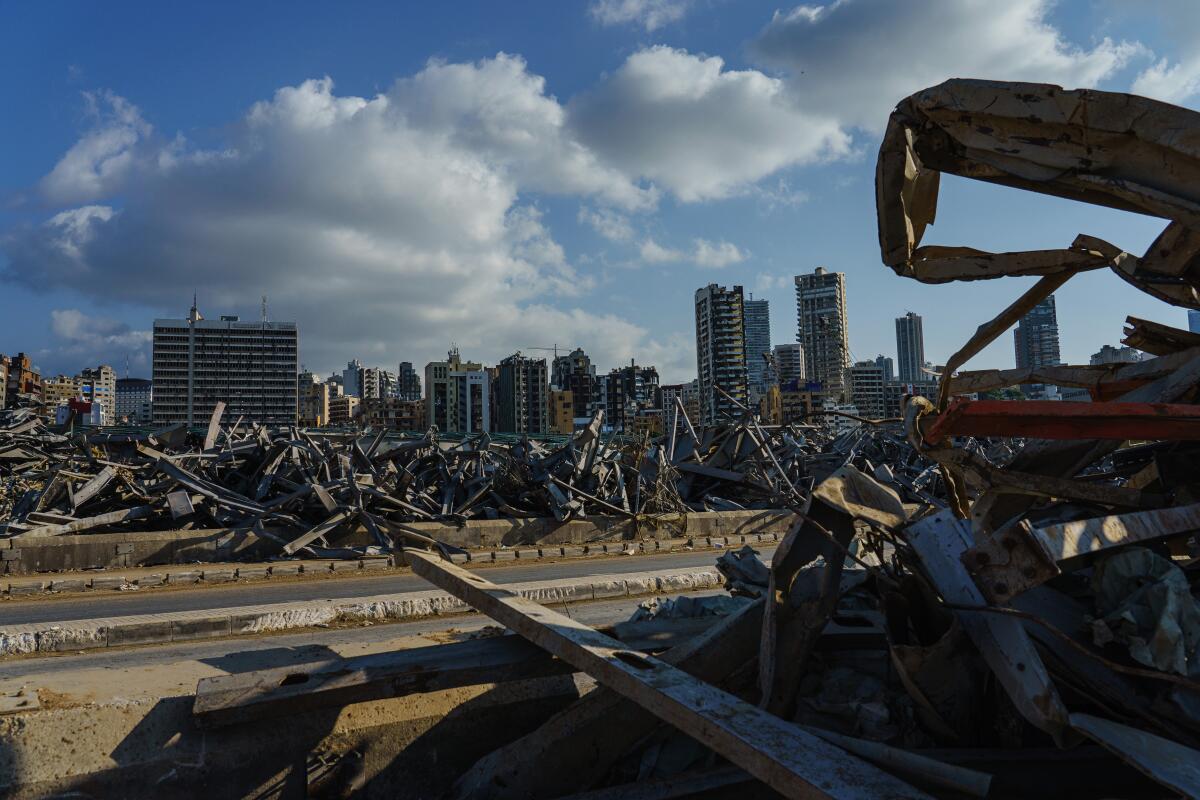Op-Ed: The blast in Beirut a year ago revealed the dysfunctional legacy of war

- Share via
BEIRUT — In the early evening of Aug. 4, 2020, a powerful explosion tore through the port of Beirut, sending a shock wave through the seaside city. Within seconds, entire blocks were pulverized, as if visited by a cataclysmic earthquake, leaving in its wake mounds of rubble and shattered glass, twisted sheets of corrugated metal and spaghettis of iron bars.
The disaster killed more than 200 people, injured 6,000, left 300,000 homeless and caused billions of dollars in damage. It appears to have been caused by an accident that ignited a stockpile of 2,750 tons of ammonium nitrate that had been seized from a ship and stored in a warehouse at the port for six years. Top security and customs officials, powerful judges and several ministers traded blame for years about what to do with the dangerous chemicals, but no one secured or removed the cargo.
The blast was the first mass casualty event in Lebanon that was not directly caused by war or civil strife. But in fact, it’s deeply connected to Lebanon’s dysfunctional political structure and its corrupt ex-warlords who took control of the state at the end of a 15-year civil war in 1990.
A year after the explosion, the investigation has stalled and no top officials have been prosecuted. Lebanon is facing a bigger economic and political crisis: Most of the country’s 6 million people are struggling to secure food, medicine, fuel, electricity and other necessities because of an economic collapse and currency devaluation.
Lebanon is undergoing a financial collapse that the World Bank has described as “likely to rank in the top 10, possibly top three, most severe crises episodes globally since the mid-nineteenth century.” Meanwhile, the country’s political and sectarian leaders are bickering over control of various ministries and have been unable to form a government since the Lebanese prime minister, Hassan Diab, and his cabinet resigned nearly a year ago, a week after the port disaster.
On July 15, Saad Hariri, an ex-premier and the country’s most prominent Sunni Muslim leader, gave up on trying to form a new government after nine months of negotiations. That means there’s no foreign bailout on the horizon; the International Monetary Fund and Western governments have declared that Lebanon can’t receive billions of dollars in assistance until its leaders agree on a new government that will carry out economic reforms.
Although the U.S., France and other Western powers coalesced around Hariri in recent months, he was unlikely to be Lebanon’s savior. On July 26, Lebanese President Michel Aoun selected a new prime-minister-designate: another billionaire businessman and ex-premier, Najib Mikati, who is now negotiating with the country’s sectarian leaders.
Mikati is the third nominee for prime minister in less than a year. And while some Lebanese are hopeful that a new government could stabilize the economy, he offers more business as usual.
Both Hariri and Mikati are part of the same political class and sectarian leadership that caused the current catastrophe in Lebanon, and that is refusing to give up power or undertake reforms. A Mikati government, like one led by Hariri, would do what the Lebanese political class does best: buy time for the current system by negotiating a foreign bailout and additional loans, even though Lebanon already has more than $97 billion in public debt — and a debt-to-GDP ratio of over 180%, one of the highest in the world.
Lebanon’s economic collapse began in the fall of 2019, when the Lebanese pound, which had been pegged at about 1,500 to the dollar since 1997, began losing its value. Lebanese banks, which helped finance the country’s debt for decades and earned steep profits for their shareholders, ran out of dollars to pay their depositors. After Hariri’s recent resignation, the pound reached 23,000 to the dollar on the black market. The currency collapse, along with a lack of dollars, has led to soaring food prices and shortages of medicine, gasoline and other imported goods.
At best, Mikati could stabilize the country until parliamentary elections are held next year.
But Lebanon needs more transformative change, starting with a government of technocrats that is not aligned with the current political and sectarian parties and that can oversee fair elections.
Unfortunately, Lebanon’s sectarian leaders have proved remarkably resilient and adept at exploiting their advantage over civil society and nonsectarian groups because the political system is built on the distribution of patronage and resources. The sectarian parties hand out not just jobs to their supporters, but food, healthcare, access to schooling and other aid. With the current economic collapse, the parties are filling the gap left by a corrupt government that fails to provide most basic services.
When Lebanon’s civil war ended in 1990, sectarian leaders and former warlords seized control of most government ministries and public institutions, extending their patronage networks. Under a process known in Arabic as muhasasa, or the dividing up of spoils, most government jobs, contracts and other resources are allocated among 18 officially recognized sects — and carefully balanced among leaders of the three largest sects: Sunni, Shiite and Maronite Christian. The Beirut port, which handled an estimated $15 billion a year in business before the explosion, is among the state institutions where sectarian leaders compete for control and carve out patronage and corruption schemes.
As the Lebanese people confront more severe economic hardships and prepare to mark the first anniversary of the devastating port explosion, it’s still business as usual for the country’s sectarian leaders. They’re keeping their grip on power and jockeying for their share of the next round of spoils.
Mohamad Bazzi is a journalism professor and incoming director of the Hagop Kevorkian Center for Near Eastern Studies at New York University.
More to Read
A cure for the common opinion
Get thought-provoking perspectives with our weekly newsletter.
You may occasionally receive promotional content from the Los Angeles Times.










